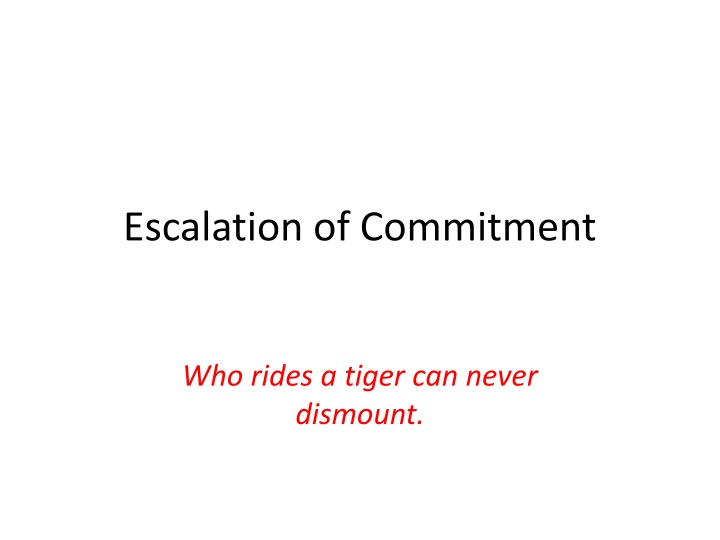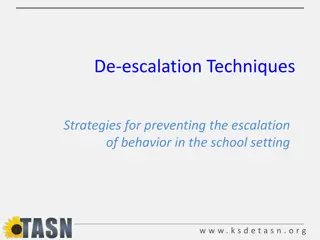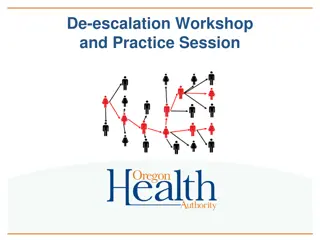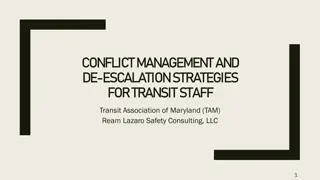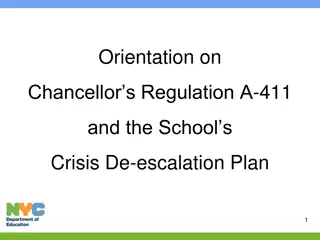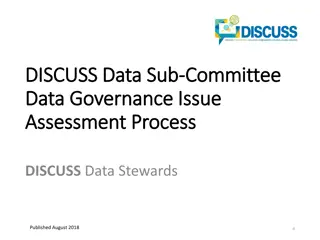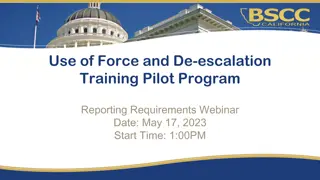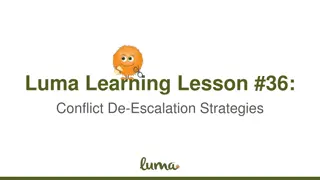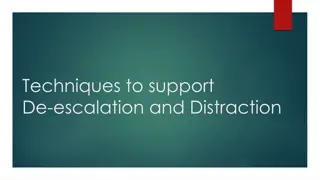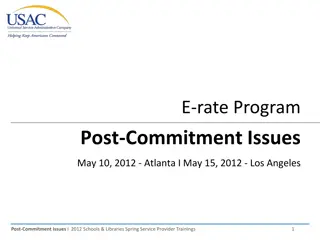Escalation of Commitment
The concept of escalation of commitment and its impact on projects and investments. Learn about the drivers behind escalation, psychological factors at play, and real-world business examples. Discover strategies to avoid falling into the escalation trap and protect against potential losses.
Download Presentation

Please find below an Image/Link to download the presentation.
The content on the website is provided AS IS for your information and personal use only. It may not be sold, licensed, or shared on other websites without obtaining consent from the author.If you encounter any issues during the download, it is possible that the publisher has removed the file from their server.
You are allowed to download the files provided on this website for personal or commercial use, subject to the condition that they are used lawfully. All files are the property of their respective owners.
The content on the website is provided AS IS for your information and personal use only. It may not be sold, licensed, or shared on other websites without obtaining consent from the author.
E N D
Presentation Transcript
Escalation of Commitment Who rides a tiger can never dismount.
OVERVIEW What is escalation? What drives it? What can individuals and organizations do to protect themselves against becoming embroiled in an escalatory spiral?
Escalation defined persistence with an important line of activity beyond an economically defensible point. Known more colloquially as throwing good money after bad .
Applies to any investment decision from being on hold on telephone to a multi-billion pound project.
BUSINESS EXAMPLES Chicago sewer system money down the drain Chinook Mark 3 helicopters NHS electronic patient record system 2012 London Olympics Amsterdam underground railway Edinburgh tram system Brandenburg airport HS2?
ESCALATORY SPIRAL Resources are invested. Feedback begins to suggest important expectations may not be met. There is an opportunity to persist or quit. Consequences of persistence and quitting are unknown.
MAIN ESCALTION DRIVERS Psychological Social Economic Organizational The simple passage of time
MAIN PSYCHOLOGICAL DRIVERS Reluctance to incur waste Risk-seeking behaviour Ego Confirmation traps
PSYCHOLOGICAL DRIVERS Choose You have two identical meals in the fridge. One cost 8.99; the other was bought on special offer for 4.99. Both have reached use by dates. Which one do you eat? As human beings we hate waste
ARE YOU RISK-SEEKING? After a day at the races you have lost 95. You have 5 left. Do you bet on the favourite at 3 to 1, or on a long shot at 20 to 1?
Choose between accepting a definite loss of 10, 000, or a 50% chance of losing 20, 000, or nothing at all?
PROSPECT THEORY Predicts risk seeking behaviour occurs when decisions are expressed (framed) as a choice between losses. A sure loss is less attractive than a much bigger loss uncertain loss.
IMPLICATIONS OF PROSPECT THEORY Quitting means incurring a sure loss. Persistence offers possibility of avoiding that loss altogether but at the risk of subsequently incurring an even bigger loss.
MONEY SUNK AND LOST Sunk costs investments made in anticipation of a return. Should be ignored when deciding how to allocate resources in future because cannot influence outcomes. Cost of a licence is irrelevant in deciding whether to continue drilling for oil. BUT sunk costs can exert a powerful hold on decision makers.
PSYCHOLOGICAL DRIVERS Ego defensiveness We find it almost impossible to believe that we could be wrong. Underscored by Confirmation traps pay too much attention to what we want to hear; Attribution traps blame failure of others or on factors beyond our control. Result: we may genuinely believe things are not too bad; success is just round the corner.
SOCIAL DRIVERS The dollar auction .
MORE SOCIAL DRIVERS Desire to look good before an audience. Perceived need to be consistent, fulfil promises, finish what we started. Reputation and commercial credibility.
ECONOMIC DRIVERS Exiting costs restrict freedom of action. They include redundancy payments; contract penalties, leasehold obligations, costs of ripping up partly completed works etc Technical and economic side-bets
ORGANIZATIONAL DRIVERS Pressure from vested interests Internal politics and non-decisions Administrative infra-structure created round project Project becomes identified with values and purposes of the organization Easier not to rock the boat
Drifting idly towards eternity Escalating Indecision
ESCALATING INDECISION Escalation can also result from the simple passage of time.
Side-bets Incidental investments that eventually make it too expensive to change direction.
Decision-makers may assume that the passage of time is somehow bringing them closer to their goal.
CURBING ESCALATION Stop!!!!! Think!!!! What might you be getting into?
The Tao Only by avoiding the beginning of things, can we escape their inevitable ends.
Consider opportunity costs The true cost of anything is what we could have had instead.
Be vigilant Define expectations Monitor progress against expectations Set limits (including budgets, mental or financial) Stick to those limits Active decisions
Think the unthinkable Is there a dictionary ?
Critical distinction Not what has been done But what remains to be done
THINK How probable is success? What am I not hearing? What benefits will this bring? What could persistence end up costing?
Real options thinking An option buys the right but not the obligation to take an action in the future. For example, to acquire land and licence but postpone drilling until oil reaches a certain price known as delayed entry option.
Real options theory Buy an escape from uncertainty instead of guessing Price of option fixed Potential gains unlimited
Options can exacerbate escalation Not always clear when safe to exercise Can be more costly than living with uncertainty Uncertainty always lurks
Even so, before exiting THINK: What options would be destroyed?
A nice problem If an opportunity offering a better return becomes available, we should switch even though it means abandoning a successful line of activity. But maybe only for a very big gain. But how big is big enough?
Finally Nothing is certain, perhaps not even uncertainty itself. Thank-you for listening. Good luck!
